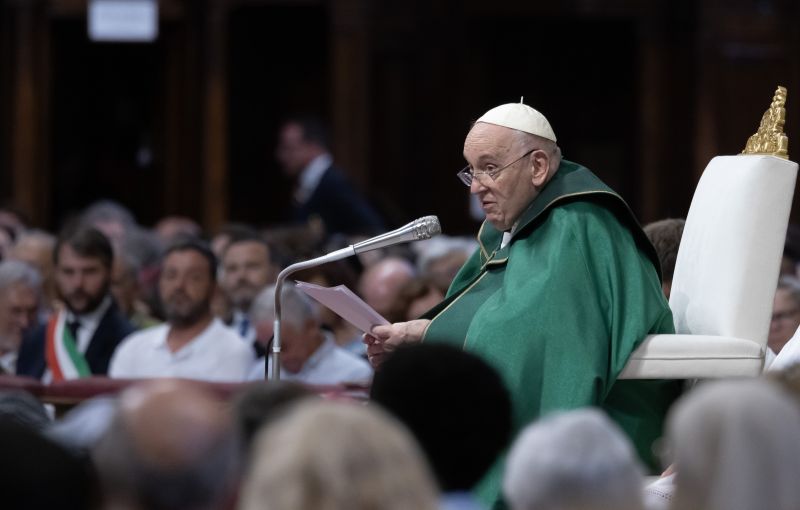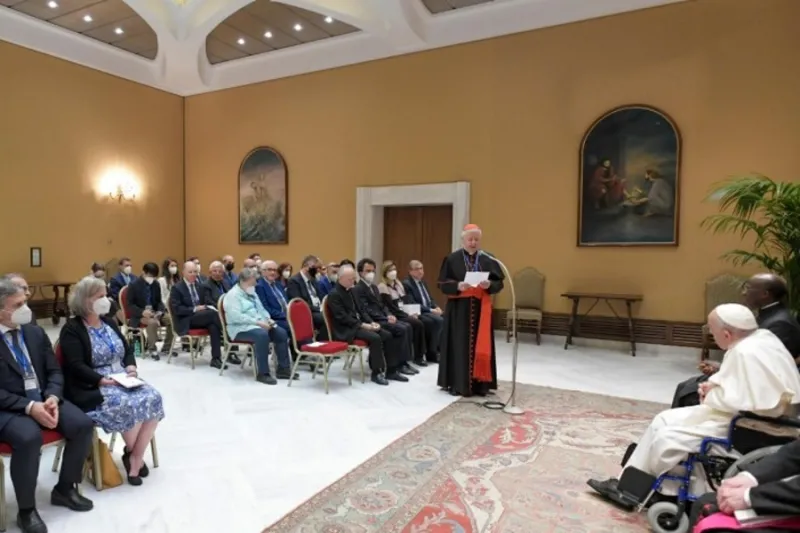
Vatican City, Aug 21, 2023 / 03:45 am (CNA).
Pope Francis announced during an audience with lawyers Monday that he is writing a second part to his 2015 environmental encyclical Laudato si’.
The pope said with this new writing he is updating Laudato si’ to cover current issues.
He made the statement on the morning of Aug. 21, at the end of a speech to lawyers from the Council of Europe member states that signed the Vienna Declaration on the Support of the Rule of Law in 2022.
Pope Francis told the lawyers he is sensitive to their care for the common home and commitment to the development of regulatory frameworks for environmental protection.
“We must never forget that the younger generations are entitled to receive from us a beautiful and livable world, and that this invests us with grave duties towards the creation we have received from God’s generous hands,” he said.
Laudato si’ is the second of three encyclicals published in Pope Francis’ pontificate thus far. It was released in June 2015.
The title, which means “Praise be to you,” was taken from St. Francis of Assisi’s medieval Italian prayer “Canticle of the Sun,” which praises God through elements of creation like Brother Sun, Sister Moon, and “our Sister Mother Earth.”
The theme of the encyclical is human ecology, a phrase first used by Pope Benedict XVI. The document addresses issues such as climate change, care for the environment, and the defense of human life and dignity.
In Laudato si’, Francis wrote that human ecology implies the profound reality of “the relationship between human life and the moral law, which is inscribed in our nature and is necessary for the creation of a more dignified environment.”
If you value the news and views Catholic World Report provides, please consider donating to support our efforts. Your contribution will help us continue to make CWR available to all readers worldwide for free, without a subscription. Thank you for your generosity!
Click here for more information on donating to CWR. Click here to sign up for our newsletter.





Were yours truly the ghost writer for Pope Francis, a framing that I might propose would include the following themes (ranked as shown). It’s not only that an updating might be needed, but also that Laudato Si was a bit rough because it was admittedly accelerated to coincide with the politics of the Paris Climate Accord.
1. A restored DISTINCTION between the, yes, interrelated “human ecology” (e.g., the family) and the “natural ecology,” more than is provided by the conflated “integral ecology” (only the merged family of man?). Example, the moral equivalence between aborting our own children, the de facto triaging of ecological vulnerable human populations, and the abortion of the planet as our common home (our global amniotic sac).
2. The Catholic Social Teaching as the application of universal MORAL VIRTUES rather than as any ideology (the negation of all ideology!): prudential judgment (caution despite and even because of scientific uncertainty), courage (political), temperance (both personal and cultural), and fortitude.
3.An eye to the Church’s direct responsibility as the dark side of progressive modernity unfolds, by recalling a broad definition of “the preferential option for THE POOR”: “This option is not limited to material poverty, since it is well known that there are many other forms of poverty, especially in modern society—not only economic, but cultural and spiritual poverty as well” (Centesimus Annus, 1993, n. 57).
4. More HONEY less VINEGAR: More credit/encouragement to those kinds of programs well underway, or only partially, to preserve what is being lost or fix what is out of balance: conservation (whether Teddy Roosevelt’s national part initiative, or the transnational/public-private Nature Conservancy), environmental impact analyses (in the U.S. since 1969), or sometimes the corporate triple-bottom line (profit, loss, social/environmental factors).
5. A more developed message on the inseparability of the CST PRINCIPLES of Solidarity/ Subsidiarity (see again Centesimus Annus on human initiative/ethical markets, nn. 32, 44). Acknowledgment of knotty problems—details within the domain of those responsible for the common good (Vatican II)—in navigating uneven economic burdens and disjointed “politics” between the developed nations and India, and Marxist regimes.
#4 “…Teddy Roosevelt’s national parks [not “part”] initiative…” now totaling 52 million acres or 80 thousand square miles (0.08 million). https://en.wikipedia.org/wiki/List_of_national_parks_of_the_United_States From the internet, the Nature Conservancy operates in over seventy countries and the goal for 2030 is to have preserved 650 million hectares or 2.5 million square miles, a land area twice the size of India.
By comparison, the total land surface area of the earth is 197 million square miles, of which about one-third is devoted to agriculture and about another one-fifth to urbanization.
Was Francis of Assisi a borderline idolater? Or were the writings, fairytale ditties like the sermon to the fishes, the converted maneater wolf of Gubbio, the poem Brother Sun Sister Moon the pious inventions of adherents?
There are only two examples of alleged documents written by Saint Francis, one, to Leo of Assisi praising God. This first letter was a parchment, hand written on both sides. The other was a letter written to Bro Leo on his scruples regarding the Gospels.
Francis’ writings were redacted by his first followers. Francis insisted they be copied exactly as written. There’s reliable evidence they were not. Words were changed to ‘polish’ the image of the saint. Other letters, one to Elizabeth of Hungary, were lost (Franciscan Tradition: Francis of Assisi: Early Documents – The Saint. Armstrong, Regis, O.F.M. Cap.|Hellmann, J.A. Wayne, O.F.M. Conv.|Short, William, O.F.M.|Francis of Assisi, Saint, 1181-1226).
My purpose is not to denigrate the beloved saint, or to criticize Pope Francis for quoting him, although I do have misgivings following Pachamamma in the Sanctuary of St Peter’s, and the emphasis on the environment to the negligence of more concrete moral issues.
My purpose is to expose the real possibility of a more manly Francis, one who seriously followed Christ, prepared to reject the world, suffer the darkness of Mankind’s sins on Mount Alverna and receive the stigmata. Leaving us a legacy more consistent with that of saint Paul the Apostle, and Christ. Not however to totally diminish the possibility of his affinity with nature, rather to realistically temper it
Fr. Peter: Please do your research and read about the now exposed (and personally admitted) “Pachamama” drama as having been staged by Taylor Marshall of which he monetized a lot. Please stop spreading this smear campaign against Pope Francis.
Theodore Misiak set the standard for social as well as ecological justice in ‘The fruits of environmentalism and of social justice’. “We cannot have social justice without virtuous people”. For the environment and human ecology the standard is similar, We invariably cannot have just human ecology without virtuous people. That was brought home to me when flyfishing on pristine Canadice Lake NY. Smallest of the Finger Lakes Canadice is a watershed for Rochester.
Shocked when I learned that the Lake had to be dredged, drained for retrieval of barrels of deadly waste materials dumped years prior when regulations for waste disposal were insufficient. Although dumping in lakes was forbidden, industrial subcontractors weren’t concerned about poisoning people in Rochester. Cutting costs was more important.
Our planet, God’s beautiful gift, his assigning us as stewards hasn’t gone well. We can regulate with severe penalties but if there’s opportunity industrialists will likely exploit it. Our faith has wider repercussions than frequently realized. Laudato si’ 2 if well thought out can contribute to an environmental moral conscience.
Yes, Fr. Peter, we need to rescue St. Francis from this pontificate. The great repentant lover of Christ crucified is portrayed as a sixties hippy environmentalist frolicking in a bird bath. St. Francis loved all creation because he loved the Creator.
Have you read his last will and Testament? It is very beautiful. See page 65 the Franciscan Omnibus of Sources. The writings of St. Francis begin on page 44. https://archive.org/details/OmnibusOfSources/page/n825/mode/2up
I just watched and heard it narrated by the Franciscan Media Center India on YouTube. The narration and filming was excellent. The text appears an authentic representation of the saint.
Francis initially focuses on his love of priesthood, although we know out of his remarkable humility he remained a lay brother. He also left the Rule for the Order of Franciscans, which had to be modified because of its severity. There’s a collected ‘Works of the Seraphic Father St Francis of Assisi’. It doesn’t provide a publisher except that it was produced by the Order based on an 1848 Cologne Germany translation. It has the imprimatur of the Bishop of Birmingham England. It seems authentic.
Check out his writings in the Omnibus I linked. The Saint’s writings can’t be more than 100 pages. Try praying aloud his Praises and Prayers.
For the record, St. Francis was Ordained a Deacon to preach. For instance, he preached Christmas Mass at Greccio where he made the first crèche. St. Francis had such a reverence for the Eucharist he carried a broom around when he preached to clean the Churches in each town! He was constantly memorizing Scripture for prayer and share it through preaching. All of his writings are imbued with Scripture. God’s peace.
The earth, the air, the land and the water are not an inheritance from our fore fathers but on loan from our children. So we have to handover to them at least as it was handed over to us – Mahatma Gandhi
Spot on Dr. C. Gandhi has more to do with this pontificate than St. Francis.
“We do not inherit the Earth from our ancestors, we borrow it from our children.”
Words also attributed to Chief Seattle (1786-1866), Oscar Wilde (1854-1900), and even the later Wendell Berry (1934-) and others. Of interest to some, Chief Seattle converted to Catholicism as a seasoned adult in 1848 (under the name Noah), and Oscar Wilde converted only very near his death; while Berry identifies as the “ultimate Protestant”.https://www.catholicworldreport.com/2014/08/19/the-ultimate-protestant-wendell-berry-same-sex-marriage-and-the-new-state-religion/
The saying is sometimes linked to Chief Seattle’s famous speech of 1854 (https://www.historylink.org/File/1427). The words do not appear there, but some of which reads this way about the indigenous peoples’ bond to nature:
“Your dead cease to love you and the homes of their nativity as soon as they pass the portals of the tomb. They wander far off beyond the stars, are soon forgotten, and never return. Our dead never forget the beautiful world that gave them being. They still love its winding rivers, its great mountains and its sequestered vales, and they ever yearn in tenderest affection over the lonely hearted living and often return to visit and comfort them.”
Like her father, Chief Seattle’s eldest daughter, Kikisoblu (c.1820-1896, renamed Princess Angeline) was also baptized and remained a Catholic until her own death, and is buried in a Seattle’s Lake View Cemetery.
And we don’t need to be lectured about it from people whose motivation is to use the issue as a rationalizing cover to make support for mass murder of inconvenient life seem like a benevolent service to the planet.
History repeats itself, first as tragedy, second as farce.
He long ago ran out of things to say. It’s now gotten to the point where he is issuing sequels to his own lousy originals. Christians are being murdered and persecuted in Nigeria, Pakistan, Nicaragua, Vietnam and many other countries (including, increasingly, Western “democracies”). Yet, this pope can’t write a letter to encourage the faithful who are under siege and condemn the evil regimes that are committing these crimes. To do so, of course, he would have to attack his allies and partners, like the CCP. So instead, he returns to repeat his pseudo-scientific claims about “climate change” and make equally bogus theological declarations about our moral obligation to submit to the Green Agenda.